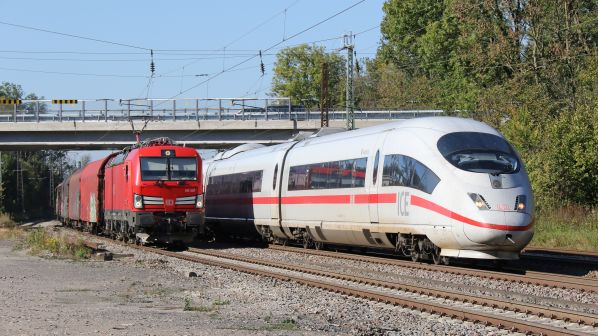THE German parliament has approved plans presented by the federal government to waive or refund up to 98% of track access charges paid by commercial rail operators since March last year, with the arrangement extended to December 2021 for freight and into 2022 for long-distance passenger operators.
The planned reductions and refunds only apply to commercial activities, which excludes all contracted local and regional rail services.
Almost all freight operators and long-distance passenger operators, including DB Long Distance, FlixTrain and other more niche open access operators such as Thalys’ Aachen - Dortmund and RDC’s Autozug Sylt Westerland services, will be eligible for the refund.
However, the main beneficiary will be national railway German Rail (DB). Infrastructure manager DB Networks will be reimbursed for the loss of track access revenues in line with the emergency provisions agreed by the European Union in June 2020, while DB Long Distance and DB Cargo will be the biggest operators to benefit.
The decision comes a year into the coronavirus pandemic, which saw long-distance passenger numbers in Germany fall by 46% whilst freight traffic has been disrupted by lockdowns, personnel shortages and multiple other issues resulting from government responses to the pandemic.
The German government’s initial response to the financial problems suffered by the rail sector was to propose a €5bn capital injection into DB in May 2020. However, this has faced opposition from competing freight and passenger operators as well as the EU Commission, which sought concessions such as third-party access to DB’s passenger website and apps, which DB declined.
In December 2020 the German government approved an increase to DB’s tax ceiling to €32bn, along with plans to extend this to €35bn in 2021.
The new policy to fund track access charges directly reflects the government’s failure to obtain EU approval for the capital increase so far.
The new track access funding will replace around €3bn of the capital increase. The additional cost of funding freight operators’ access charges is €600m, in addition to more limited funding already announced amounting to around €350m. DB Cargo reported an Ebitda loss of €321m in 2020.
DB Networks generated €5.6bn in turnover in 2020, largely but not exclusively from track access charges.
For long-distance passenger operators, the total cost to the government will be around €1.8bn by 2022. DB Long Distance was the only passenger operator which continued operating the majority of its services throughout the pandemic at the request of the government. Competitors such as FlixTrain ceased services on several occasions due to lockdowns and may now question whether they too would have continued operating if they knew that track access charges would be effectively waived.
DB Long Distance made an Ebitda loss of €1.3bn in 2020 with revenue down 42% to €2.9bn; the impact of the retrospective 2020 and 2021 ongoing access charge reduction is likely to be around €1.5bn, which may result in the operator turning a profit in 2021.
Positive reaction
The German and European rail industry has largely welcomed the government’s decision.
“With the now planned reduction in train path prices, the federal government is supporting the entire industry and not just DB,” says Mr Ludolf Kerkeling, chief executive of the Network of European Railways (NEE) representing more than 80 private rail freight operators.
Mofair, which represents private passenger operators, said it “welcomes change of course by the federal government in coronavirus aid for ‘commercial’ rail transport,” but added that the additional funding for state supported public transport needs to continue urgently.
One off opportunity?
For freight operators, some of whom remained profitable or came close to breaking even in 2020 despite the pandemic, the sudden infusion of retrospective refunds coupled with the prospect of a boost in profits in 2021 presents an opportunity to aggressively grow the market as rail freight’s single biggest competitive disadvantage compared with road haulage - the high level of rail access charges - has been removed, albeit only temporarily.
Those operators who succeed may be able to convince politicians at national and EU level of the need to rethink the access charging regime in the long-term in order to grow rail freight’s market share.

